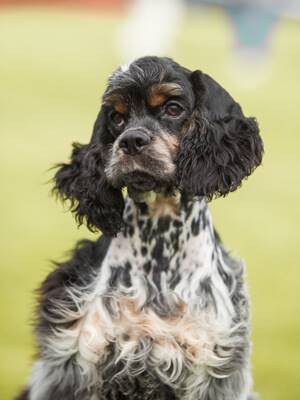- Home
- Cocker Spaniel training
Cocker Spaniel Training Tips: How To Bring Out the Best in Your Dog!
Cocker Spaniel training and dog behaviour very often go hand in hand.
Training your puppy from an early age and setting him guidelines and boundaries will help your new little boy grow into a happy, well-mannered adult Cocker without behavioural problems. Isn't that what we all want? Here's how!
Cocker Spaniel Training Tips & Techniques
Cocker Spaniel training and behaviour; the two are inextricably linked.
Good training leads to good behaviour; if your Cocker Spaniel is well-trained, it's likely that he's also well-behaved.
We teach our children the difference between right and wrong, what is acceptable behaviour and what isn't, so why shouldn't we do the same for our pets?
Unfortunately, many Cocker Spaniels end up being put into shelters (or, sadly, worse) because their owners couldn't handle them.
And yet, it's often unnecessary because understanding what you must teach your dog and how your dog learns can make all the difference between being able to manage and enjoy your dog and having to rehome him.
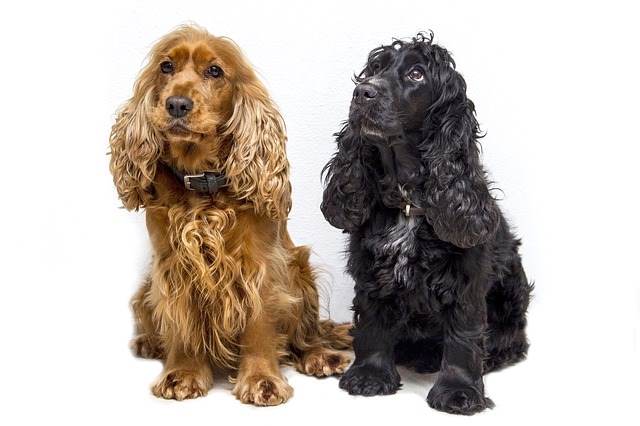 What do you want us to do now Mum?
What do you want us to do now Mum?Cocker Spaniel Training & Behaviour
So, hands up all those who want a happy, well-trained, well-behaved Cocker Spaniel!
Wow, a sea of hands!
You can give your dog many types of training to help him live happily in our domesticated world and help him grow up without behavioural problems.
In this article, I cover general dog training tips and behavioural issues and how training your dog can help; click on any of the titles to read more:
Cocker Spaniel Training and Puppy Obedience
Giving your Cocker Spaniel training as soon as you bring him home is the best place to start; it's never too early to begin basic obedience training for puppies.
Teaching your puppy obedience commands will give him (and you!) control and good manners, leading to a well-behaved Cocker Spaniel.
But obedience training doesn't (and shouldn't) stop there.
Once learned, these commands must be practised daily and in different situations and environments to help strengthen his training.
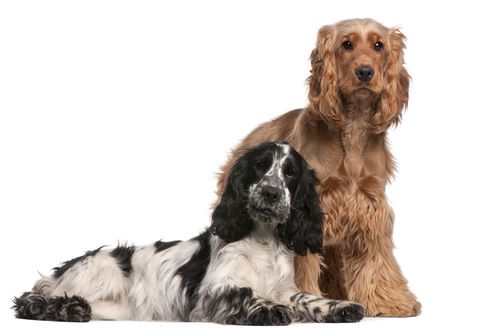 You want us to do what?
You want us to do what?Don't worry; it sounds like more work than it is, and you can easily practice each lesson during the day. For example, you can ask your pup to sit before you:
- feed him,
- let him out into the garden,
- clip his leash onto his collar,
- play a game with him (hide and seek is Max's favourite!).
Each time you give your puppy a command, and he responds, you strengthen that command.
Eventually, you won't even need to ask him; your dog will automatically sit before you feed him or attach his lead to his collar.
Here's a link to my article on Cocker Spaniel Training for Puppies. You'll find all you need to teach your puppy to sit, stand, lie down, wait, stay, etc.; in fact, all the basic commands your pup (or dog) will ever need!
And if you need tips or advice on the best way to approach your puppy's training, follow either link. Just remember, training Cocker Spaniels should be fun for you both.
Look at this well-trained Cocker Spaniel and see how happy he is to go through his training paces!
Cocker Spaniel Training: The Alpha Dog
Contrary to popular belief, alpha dog training isn't about fear and intimidation.
It's about setting ground rules for your Cocker Spaniel (like we do for our kids) to help your pet understand his place in your pack and respect you as his leader.
Alpha training is now more about establishing boundaries and building a strong, positive relationship with your dog. It's about helping your Cocker become a respected and loved family member.
Toilet Training An Adult Dog
If you find yourself having to toilet-train an adult Cocker Spaniel, you could be in for a frustrating time. However, if you don't address this lapse in his toilet behaviour quickly, your dog will form the habit of peeing wherever he wants, and habits can be difficult to break!
Re-toilet training your dog will be challenging unless you know what you're doing.
You must first understand why your dog has suddenly begun peeing or pooping indoors before you can treat the cause. For example, your dog may have an underlying health issue.
Health issues aside, you will need to take action now that their toilet habits are no longer up to the mark (no pun intended!). You must begin the toilet training process again from scratch.
Be rigorous and stick to it to ensure your adult dog understands your house rules.
It may be more complicated than house-training a puppy, but you can do it with patience and consistency.
Here's how to toilet-train an adult dog.
Dog Crate Training
Giving your dog a place of his own can make all the difference to his feeling of security; it can also help with separation anxiety.
By giving your Cocker Spaniel training to use a dog crate, you will provide him with his very own safe place (where he can go for a bit of peace and quiet when things get too hectic for him).
Crating your dog can help with toilet training, too, because dogs don't like to foul in their den.
And there is still time; despite what they say, you can teach an old dog new tricks, or at least you can teach an older dog to use a crate, even if he's never experienced one before.
Whilst crate training a dog may be a little more complex than teaching a puppy to use his crate, you CAN do it!
The secret to success is lots of coaxing, an abundance of treats and praise, and taking things very slowly...one step at a time.
Attention Seeking Behaviour
Our dogs can sometimes develop annoying habits such as jumping or barking, especially if we didn't train them well in the first place or if we leave out pets to their own devices.
Owners who don't do anything to discourage these (unwanted) attention-seeking behaviours will see their dog's behaviour snowball into such proportions that it soon becomes a battle of wits to co-exist alongside their pets.
Some behaviours may initially seem cute (like your puppy jumping up for a cuddle). However, you may no longer find it so appealing when your puppy becomes a fully grown adult and wants constant attention from you or your puppy leaps up at anyone who dares walk through your front door!
We don't mind if our Cockers bark if they hear someone at the front door, but we don't want them to continue barking once we open the door to greet our guests.
We certainly don't want our dogs to bark all of the time.
 A well-behaved Cocker Spaniel - training at its best!
A well-behaved Cocker Spaniel - training at its best!Jumping and barking is unwanted behaviour, and you must manage it; otherwise, it may soon be accompanied by whining, pawing, scratching, digging or chewing (your favourite shoes!), all aimed at getting your attention.
Nip it in the bud!
Here's how to give your Cocker Spaniel training to stop those annoying attention-seeking behaviours and teach your pet some good manners before they really get out of hand.
Separation Anxiety & Destructive Behaviour
Generally, dogs don't like to be left alone. They are pack animals used to living together, working with their pack, eating, playing and sleeping together.
If dogs become separated from their pack (and don't forget, in their domesticated world, YOU are their pack), they can often become anxious and distressed...and that's when the trouble begins.
Some dogs can handle being left alone for a while but soon become bored and restless. When that happens, they often go looking for mischief!
They try to relieve their boredom by, for example, raiding the rubbish bin or chewing the legs of your favourite dining chair!
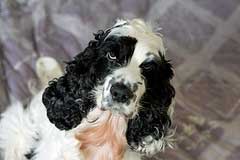 I'm a well-trained Cocker Spaniel!
I'm a well-trained Cocker Spaniel!Separation anxiety is common in all breeds of dogs. However, the good news is that you can train your Cocker Spaniel to help him manage better and be more comfortable when you're away from home.
If you'd like to know more about separation distress and understand what can trigger it, the signs to look for, and how you can help your Cocker to get used to being on their own, choose one of the following links:
- Separation anxiety in puppies;
- Separation anxiety in dogs.
Like most Cockers, Max hates me going out without him, but I do leave him occasionally because I need to live my life.
However, I always take certain precautions before leaving the house to ensure he'll be comfortable and happy while I'm away. They work for me!
Rage Syndrome & Aggressive Dog Behaviour
I'm often asked questions about aggressive dog behaviour by worried owners who believe their dog may suffer from Cocker rage. So I will direct you to a page about it, but before you read it, please let me put the record straight.
Cocker Spaniel Rage Syndrome is a rare condition.
Aggressive dog behaviour is very often incorrectly labelled as Cocker rage syndrome. Please understand that they are not the same; there are distinct differences in the behaviours of each.
If you have an aggressive Cocker Spaniel, it is doubtful he's suffering from Cocker rage. You can read more about Cocker rage syndrome and see for yourself.
Cocker Spaniel Barking
Excessive barking can drive you (and your neighbours) mad; however, before you can stop your dog from barking, you must first work out why he's barking. Once you do that, you can take steps to remove the problem.
Problem removed, problem resolved! It's as simple as that, well, almost!
If your Cocker Spaniel barks when he's in the garden, here's how to fix that. Hopefully, you'll be able to make friends with your neighbours again!
If your dog constantly barks at visitors to your home, here's how to remedy that.
If your little puppy's barking seems no longer cute, here's how to stop your puppy barking. I recommend you begin this training when you get your puppy home; it's never too early!
While I favour positive reinforcement dog training methods, I accept that it's sometimes necessary to use barking deterrents, which lean towards negative training.
You'll find many barking deterrents on the market that can help; some are better than others. I leave you to make up your own mind.
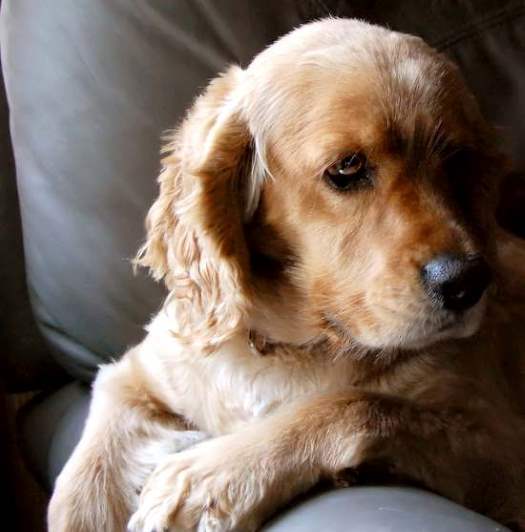 I don't bark; I'm a good boy!
I don't bark; I'm a good boy!Dog Food Aggression
Food aggression in dogs is an instinctive aggressive behaviour triggered by your Cocker's (often irrational) need to protect his food.
If your ordinarily docile Cocker seems anxious or growls when you approach him while he's eating, it's almost certain that he's displaying 'Food Aggression'.
Not addressing this behaviour quickly can lead to highly aggressive (and dangerous) behaviour, especially where children are concerned. You must handle food aggression as soon as you notice the warning signs; otherwise, you're in for a bumpy ride!
Although it's a relatively common canine problem, it can begin anytime and for no apparent reason. (There's always a reason, it just may not be obvious).
Although there's no guarantee, there are some steps you can take to help prevent dog food aggression.
If your Cocker Spaniel is already twitchy when people are near him while he's eating, here are a few suggestions on how best to handle it.
OCD in Dogs
OCD stands for obsessive-compulsive disorder.
It's an excessive habitual behaviour, so if you see your dog chasing his tail, snapping at invisible flies, or if your dog is chasing shadows to excess, constantly licking, pacing, etc., then he may have OCD.
If you believe your Cocker may fall into this category, read on to learn more about obsessive-compulsive disorder in dogs.
Stop Your Dog From Eating Poop!
A dog or puppy eating poop is one behaviour problem many pet owners find revolting, and who can blame them?
Coprophagia (eating poop) is offensive and repulsive to humans; however, it's a fairly common practice in the doggie world, especially in puppies.
There are many reasons why dogs eat poop, and, thankfully, many grow out of the habit, but for those that don't, here's what you can do to stop your dog from indulging in this awful habit!
A Tired Cocker Is A Quiet Cocker!
We all know that a tired dog is a contented (and therefore quiet and well-behaved) dog!
So, how do we tire them out?
- Let them run around the park?
- Take them for a long walk through the woods?
- Throw sticks into the river for them to retrieve?
Well, yes. These are all excellent activities for our pets, but they shouldn't simply end there.
Physical exercise may give your dog an excellent workout, pumping his heart and lungs nicely. However, you should also consider stimulating your Cocker Spaniel's mind to give his brain a workout.
You can do this by practising obedience training whenever you get the opportunity, by letting him work out a puzzle toy, or by playing a game with him, such as hide and seek.
Physical and mental stimulation will help burn off all his excess energy and help your Cocker Spaniel to become calm and relaxed. He'll probably be happy to snooze or lie quietly, watching the family's comings and goings around him.
Prevention Is Always Better Than The Cure!
As well as setting boundaries and giving your Cocker Spaniel training (lots of it!), there is another way we can help our Cockers behave well.
You'll never completely stop your dog from doing what comes naturally, like mouthing, chewing, jumping, barking, or scavenging (and in fairness, you probably shouldn't). However, you can direct this behaviour to other things that are acceptable to you.
For example, if your Cocker likes to chew, replace whatever he's chewing with a safe chew bone or toy, such as a Kong.
You can often prevent some behaviours with some strategic thinking (or common sense!). For example, I'll never be able to stop Max from rifling through the recycle bin while I'm out (trust me, I've tried!).
However, I did find a simple solution. I now ensure the cupboard door to the recycling is closed tight before I leave the house...doh!
Suppose your Cocker is a (closed) door-scratcher while you're away. In that case, consider moving the bin into the garage, allowing you to leave the door cupboard door open. Your dog won't scratch on an open door.
See, there's almost always a 'strategic' solution; you just need to think it through - Cocker Spaniel training at its best!
Cocker Spaniel Training: Conclusion
I genuinely believe that we can help to influence our dog's temperament and personality by what we teach our pets and how we behave towards them.
Of course, the breeder plays a large part in this, for example, by breeding from good-natured parents and the quality of the initial socialization they give to their puppies.
However, it's then down to the eventual new owner of the puppy to finish shaping its temperament and character.
You can do this by giving your Cocker Spaniel training right from an early age and deciding exactly how you want your puppy to behave. You set the appropriate guidelines and boundaries he needs to become a happy, confident, and well-adjusted adult dog!
Photo credits for Cocker Spaniel Training:
1. Vlaaitje at https://pixabay.com/photos/dogs-cocker-spaniel-spaniel-dog-4716739
2. Isselee at https://www.dreamstime.com/royalty-free-stock-photography-two-english-cocker-spaniels-2-years-old-image18673627
3. Lilun at https://www.dreamstime.com/stock-photography-american-cocker-spaniel-puppy-image22371342
4. Visitor Photo
5. Jeff Dutton at https://www.freeimages.com/photo/boston-1368207
